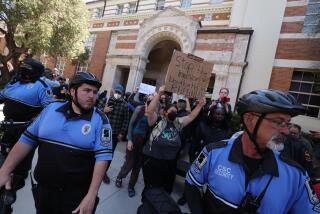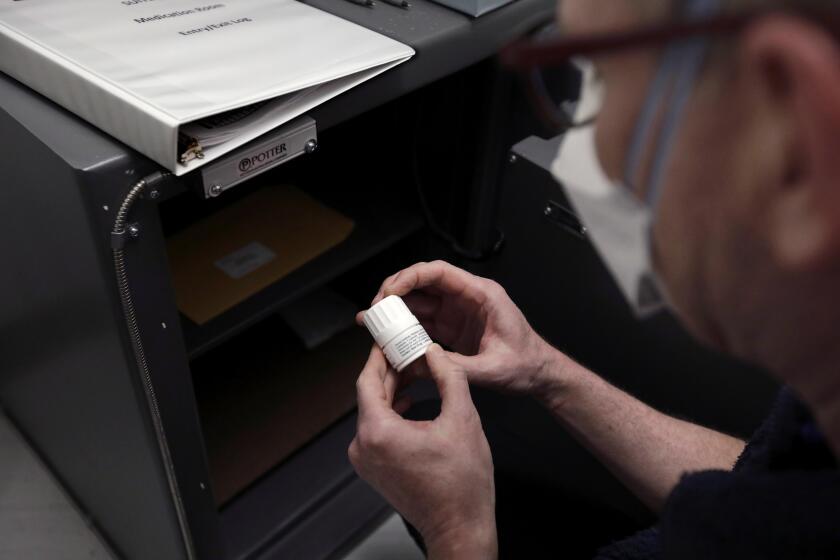State’s Choice of New Building and Fire Codes Angers Many Officials
California’s building standards commission has adopted new fire and building codes that are backed by politically powerful unions and strongly opposed by building officials, who say the rules will be more costly and cumbersome to enact.
The Building Standards Commission voted 8 to 2 Tuesday to adopt the codebook published by the National Fire Protection Assn., favored by plumber and firefighter unions. They rejected a codebook published by the International Code Council and preferred by city and county officials and structural engineers.
For the record:
12:00 a.m. Aug. 2, 2003 For The Record
Los Angeles Times Saturday August 02, 2003 Home Edition Main News Part A Page 2 National Desk 1 inches; 58 words Type of Material: Correction
Building standards -- An article in Friday’s California section about new building codes misidentified a member of the California Building Standards Commission as Jimmy H. Smith. His name is Jimmy H. Hill. The article also incorrectly reported that codes written by the International Code Council are mandated in 48 states. The ICC codes are used by 45 states.
The vote makes California by far the largest government to endorse the NFPA codebook, which is in use only in the town of Pasadena, Texas, and in Rhode Island. The ICC codes are mandated in 48 other states, building officials said.
The codebook will serve as the template from which California officials craft a new set of building codes. Its proposed adoption had inspired heated debate among building officials across the state and charges of political payback at the Capitol.
Three Republican lawmakers unsuccessfully sought Tuesday to postpone the vote until the state Fair Political Practices Commission could investigate complaints that two building standards commissioners with union ties should abstain from voting on the issue.
One of the lawmakers, Assemblyman John Campbell (R-Irvine), called the vote a “blatantly political payoff” for the unions that have defended Democratic Gov. Gray Davis as he faces a Republican-led campaign to recall him at the polls Oct. 7. The anti-recall effort is based at the Sacramento headquarters of the California Professional Firefighters, and the plumbing trade has donated more than $3 million to Davis since 1998.
If the selection of a new building and fire code “provided additional safety that was corresponding to the cost,” said Campbell, “there’s an argument for it. But the reason you have so many building officials against it is because clearly they believe it doesn’t.”
Two members of the standards commission with union ties who voted to adopt the NFPA codebook say there was nothing political about their decisions.
“Nobody told me how to vote,” said Barry Broad, a Davis appointee and a lobbyist who has represented the plumbers union. “Nobody even contacted me to inquire how I intended to vote.” He called the political allegations “the invention of people who were obviously desperate to win at any cost.”
Both the NFPA and ICC are nonprofit organization that stand to sell codebooks and training seminars to hundreds of California cities and counties.
Broad and Commissioner Sidney Cavanaugh, a special representative to the United Assn. of Journeymen and Apprentices of the Plumbing and Pipe Fitting Industry, said they voted for the NFPA codebook because the state fire marshal endorsed it as having stronger safeguards.
The commissioners also said they preferred the more inclusive process the NFPA uses in writing its codebooks.
NFPA gives responsibility “to all kinds of different members of the public, including manufacturers and builders and the disabled community,” said Broad.
“The other, International code has a system in which the final vote, the basic power, is vested only in building officials,” he said.
Jimmy H. Smith, a deputy L.A. fire chief who sits on the panel, said he voted to adopt the NFPA codes because they offered “a better margin of safety.”
Broad said he was not persuaded by the argument of many building officials that switching to the untested NFPA template from the old version of ICC codes currently in use would require time-consuming, costly training for cities and counties.
“I am troubled by monopolies,” Broad said. “Much of the argument for why we should have the ICC was that it is similar -- although it’s new -- to the previous code we had for the last 10 years or so, and therefore we should adopt it.... The problem then is you create a hometown advantage for whichever code you’ve chosen.”
Some fear that the adoption of the NFPA codebook will slow the construction of public schools. In documents submitted to the commission, state architect Steve Castellanos wrote that his staff could fine-tune a package of ICC-based building standards within a year. But it would take two or three times as long, he wrote, to upgrade the NFPA codebook to California’s requirements.
The bulk of the state architect’s work involves reviewing plans for new public schools, and engineers may have to be pulled from those duties to deal with the NFPA codes, said Robert E. Raymer, a California Building Industry Assn. lobbyist.
“If school construction slows down, housing construction will slow down,” he said. “That’s not good for the economy.”
Castellanos, who backed the ICC codes, said, “There’ll be no delays in school construction as a result of the amount of work we’re undertaking to amend this code.”
Richard L. Hess, president of the Structural Engineers Assn. of Southern California, said adoption of the NFPA codebook will mean redoing the platform on which the building code rests.
He predicted that cities will struggle to find the time, labor and money to adjust to the NFPA codebook.
“This is not something that can be done within a few months or even a year or two,” Hess said.
More to Read
Get the L.A. Times Politics newsletter
Deeply reported insights into legislation, politics and policy from Sacramento, Washington and beyond. In your inbox three times per week.
You may occasionally receive promotional content from the Los Angeles Times.






